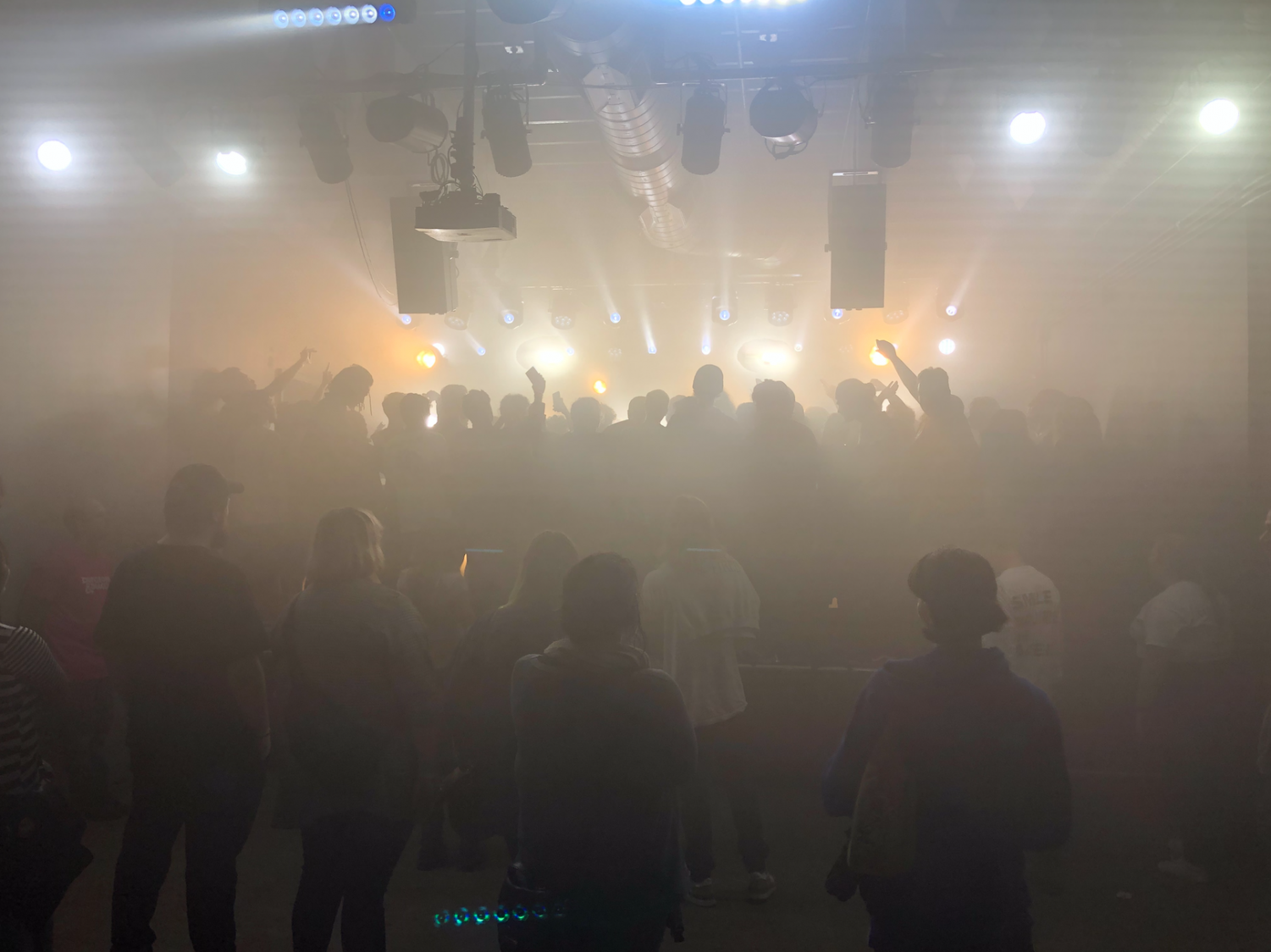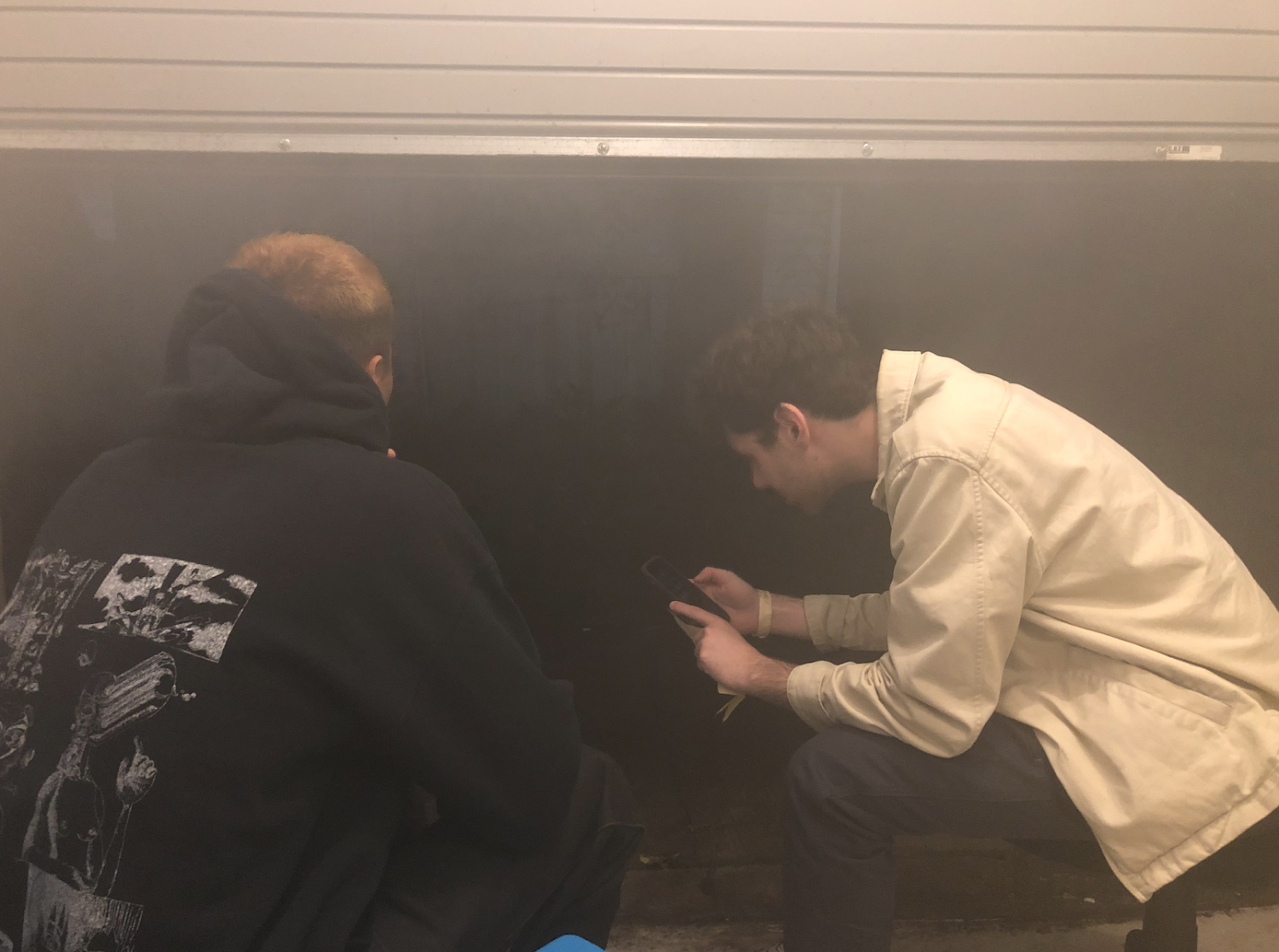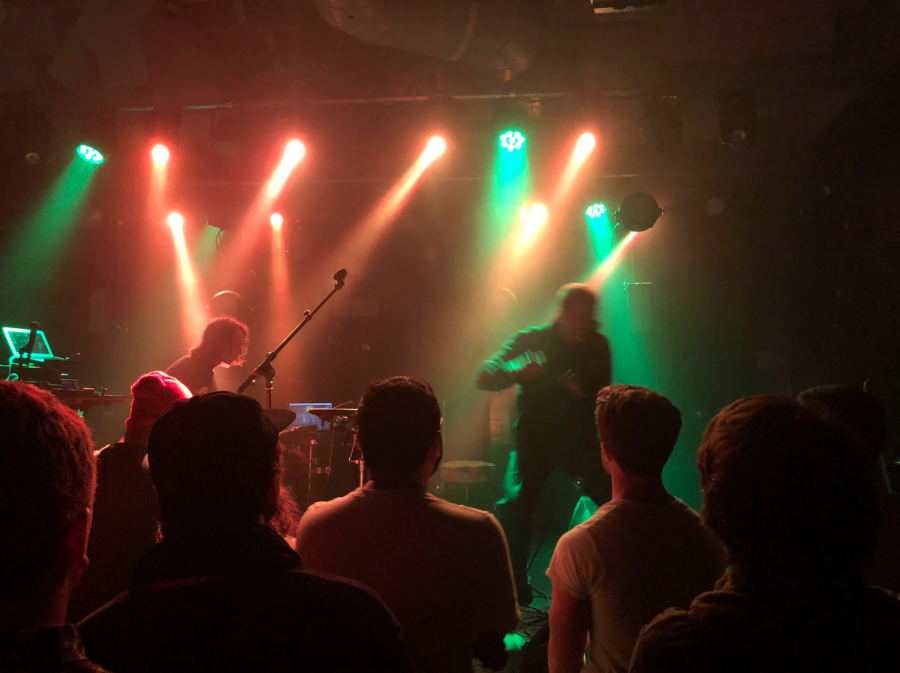A Surreal Night, Dissected | Concert Review and Interviews with Body Meat & Slauson Malone
October 25, 2019
A glitch pop group, a sound collage artist and an experimental hip-hop band all walk into a bar. What happens next is, unsurprisingly, super weird.
On Wednesday, Oct. 2, Jesse Taconelli and I went to the Injury Reserve show at El Club in Detroit, Michigan, with opening acts Body Meat and Slauson Malone. It was a cold, rainy evening, and though it was initially quiet, fans slowly meandered into the venue as the night went on. For the opening acts, the setting was particularly intimate. But by the end of Injury Reserve’s set, the crowd was completely amped up and drenched in sweat.
Body Meat, a Philadelphia-based glitch pop artist, was the first to take the stage. As he started to set up his Ableton beatpad, Slauson and Ritchie with a T – a member of Injury Reserve – came out to watch over him, bumping their heads as he pieced the beat together. It felt symbolic, as if all their performances were in harmony with one another’s.
After his first song, Body Meat moved from the keyboard to sit on a step ladder, which somehow fit perfectly with the vibe. At one point, he finished a song and the room was bewildered to silence. “Y’all probably think I’m weird as fuck,” he joked.
“I hate opening acts but I fuck with you heavy,” one fan said.
“That’s the nicest thing anyone’s ever said,” Body Meat said back. “I fuck with you heavy.”
Overall, I was floored with Body Meat’s set – especially the music itself, which I had only first heard on the car ride there. I’ve been streaming his recent album Truck Music, a 22-minute whirlwind of off-kilter beats and melodies, nonstop ever since.
After Body Meat was Slauson Malone, a sound collage artist and experimental hip-hop producer from New York. I was particularly excited for this performance because I’ve been obsessed with his debut album, A Quiet Farwell, 2016–2018, ever since it dropped in April of this year. But even being as familiar as I was with his music, I had no clue what a live performance of his would look like.
They cut the lights and the room went pitch black. A stagehand hooked up a microphone to a megaphone, which Body Meat and Ritchie with a T both screamed into one after another. Everyone was confused.
Then, out came Slauson, trudging across the stage in a leather jacket, collared shirt, jeans and bare feet. He made his way to his computer to start up the interface, which he used to chop up beats to the point of no recognition. He rapped – or rather, spoke – his lyrics into the microphone, walking in circles and looking at nobody.
Then he screamed! and scared the absolute shit out of everyone in the audience. Some jumped, while others gasped or chuckled nervously, but everyone was completely uncomfortable. One kid plugged his ears for the entire set. Shortly after, while everyone was still on edge, he walked out into the crowd, went right up to a fan and whispered into his ear. The room was paralyzed with fear.
I found that fan after the set and asked him what Slauson said. “Something like, ‘you can’t run from it,’” he said. “I was so scared, dude.”
Among the many beats he chopped up and mashed together, one of them that stood out to me was a line from “DUCKWORTH.” by Kendrick Lamar, sung by Bēkon: “It was always me verse the world / until I found it’s me verse me.”
He continued to perform with his live interface, with a few occasional plot twists. At one point he picked up a guitar and played a lonely, soulful melody. At another point, Body Meat came back on stage, sat on top of a ladder (not a step ladder, a ladder ladder) just to watch Slauson perform, then left. Later on in the set, Slauson laid down on the ground and played on his phone as the beat droned on behind him.
Before he wrapped up, he left the room with some final words, sampled from his beatpad: “It’ll never be the end. Not even Judgement Day.”
How was the Injury Reserve set? We really have no idea. After the two opening acts, we went backstage to interview Body Meat (and then Slauson, unexpectedly). We did actually catch the tail-end of their performance, though. The entire crowd – like more than two dozen people – were moshing on stage with the band. I’m guessing we missed something pretty cool.

Read below for the interviews.
Body Meat Interview
Jesse Taconelli: Is this your first time in Detroit?
Christopher Taylor (Body Meat): Yes, actually, yeah, it is my first time.
JT: Got anything good to eat?
C: We ate at the Mexican restaurant down the street.
JT: So you’re performing with some other favorites at our station. How does it feel to be on a whole tour with them?
C: It’s amazing. I feel really blessed because I get to expose my music to all different types of people around the country. They’re really nice people, so it’s like one of the best tours I have ever been on. There’s no conflicts and everyone shares everything, so it’s been great. I recommend it. Laughs.
JT: I saw that you have lived in a bunch of other places, but how did you end up in Philadelphia?
C: I have a lot of friends that live in Philly now. My friend Clark, who has a project called Pleasure Systems, sent my music to people around there, and I ended up meeting a lot of friends from the Internet there. Then I played with the band Palm, and they became very good friends of mine, and all this just came together.
JT: I know it has gone through a few different phases, but how would you describe Body Meat to somebody who hasn’t heard your music before – as of right now? You don’t have to put any genre tags on it.
C: I would say it’s rhythm music, as in it just has to do with rhythm. That’s how I write everything, and how I see the world… it’s all just rhythm. If you listen to it, you just listen to rhythms.
JT: And the newest album title is Truck Music. What does this mean to you? Is that a genre within itself?
C: Truck Music is funny because I come from a place where there is mad trucks. It doesn’t have that big of a meaning. We were all joking around one night, and I have to say my friend Kasra [Kurt from Palm] came up with it! We were joking about trucks, and playing music in them, and he said, “You should name your album ‘truck music,’ like you’re gonna listen to it in a big ass truck,” and that just stuck with me. It was just perfect because I am from a place where people are just bumping crazy shit all the time. Kasra, thank you for naming it.
JT: I don’t mean to rip a page out of Pitchfork’s write-up on you, but I also caught that you are recent to Ableton! First off, I understand being new to a DAW [Digital Audio Workstation], but how does that affect your live set?
C: Okay, so it’s weird. So, I started learning Ableton while I was mixing a lot of the live band stuff, and I just got a brief introduction to Ableton that way. When I moved to Philly and I met Matt [live drummer for Body Meat], we were jamming on random stuff. One song, “Nairobi Flex,” came from that, but I learned a lot of it from doing those sessions. I took the idea of it, and then started writing this music. Making it live was kinda hard, because some of the beats I had written were almost impossible to play, but there were some things that I could play, and Matt could play at the same time that would work. So Matt took the beats I wrote, and learned them notation-wise. It was a bit of a process but my mans got infinity hands!
JT: That’s facts.
C: Matt has a project called Infinity Dance Complex that you should keep your eye on.
JT: Can you talk to us about the different phases of Body Meat?
C: So, I had started Body Meat in 2016, and I kinda started it as a project where I wasn’t going to put my name on it, but release ideas and concepts constantly. Initially, I wasn’t even going to play the music live just because I wanted to be able to do anything that I wanted at all times, and I wanted to be able to change genre whenever I wanted. Then, it just kinda stuck, after a few friends in town heard the Bandcamp and asked me to play as that. I just got more confidence in it, and gained more confidence playing as Body Meat. It took a lot of turns, but I still like that idea. I still don’t know what Body Meat is going to sound like in the future.
JT: That was actually my last question for you: what should we expect of the future of Body Meat?
C: It’s just going to get crazier. It’s just going to keep going, and now I have found a sound that resonates with me and belongs to my heart, I am just going to keep pushing that sound. That’s the whole thing.
JT: “Heart Music?”
C: “Heart Music,” baby! I didn’t know who I was when I started Body Meat, and now Body Meat helped me figure out who I was.

Side note: The interview with Body Meat was planned beforehand, but the Slauson one was not. After we finished talking to Body Meat, we walked back into the main room backstage and saw Slauson just, like, sitting there, fiddling with a spoon. As someone who had been obsessing over his music for the better part of a year, I was extremely nervous to say anything, but knew I had to say something.
Involuntarily, I blurted out, “You killed it out there, man… you killed it.”
I’m sure that sounded really stupid, but he must have understood I was being genuine, so he said thank you. Jesse swooped in and asked if we could interview him for Impact 89FM, which he agreed to.
I acknowledged that I didn’t have any questions prepared, to which Slauson responded, “That’s okay. We can just have a conversation, you know?” One of the chillest things I’ve ever heard.
Here is that conversation.
Slauson Malone Interview
Slauson Malone: What do you guys do? Do you make music?
Jesse Taconelli: I produce. I learned from my dad, who is kind of an outsider artist.
S: Visual artist?
JT: No, he has been making tape music and rock in the basement since I was a little kid.
S: Multi-track?
JT: Yes, I have his old tape deck in my room now.
S: It’s a Tascam?
JT: Yes, it’s a Tascam Portastudio four-track, the one that you can bounce the first three onto the last one.
S: Oh that’s awesome, I know the one.
JT: How’d you get your start making music on tapes?
S: I don’t even know why, to be honest. Through mutual friends? Someone had a tape player and I liked the way it sounded, and I was like, “Oh, let me try it.” I got into music because my sister wanted to be a DJ, and I wanted to be like her. I saw her DJ, but it was too boring, so I got into making mashups.
JT: I was going to try to be a DJ, but played DJ Hero once and was like, “This sucks.”
S: Laughs. Oh yeah, DJ Hero! It’s funny how it works, huh.
Josiah Leach: Sound collage music can be hard to digest sometimes, especially on the first listen, and I wondered how the inspiration comes for you to piece something together like that?
S: Honestly, my phone. You know, we listen to music in such a fragmented way now. Sometimes I be like, damn, those two songs mean something together. It’s the Duchamp Readymade thing. We have enough stuff, is my thing. We have enough stuff, and we have so many water bottles. We could use like half of those.
JT: Water bottle music.
S: Yeah, yeah! It’s water bottle music.
JT: Josiah and I have been listening to a lot of A Quiet Farwell, 2016–2018 and a lot of the new Caleb Giles LP [Under the Shade]. Fractured is a good way to describe this production. Was that the intention?
S: The intent didn’t come until I had three or four songs together, and I was like, “Damn, I think I have an idea,” and then I was reading a lot of books.
JT: What books?
S: Saidiya Hartman Scenes of Subjection, and another one I can’t remember.
JL: I was going to say, because I think a lot of the samples are so… it feels like you did your research.
S: Yeah, big time. I think what was the breaking point was going to the record store, and going to the record store and buying a bunch of records is fine, but it got boring. Like why would I need to be going to a store?
JT: Laughs.
S: I’m serious! I don’t need to. I’m over it. Fuck petroleum, and I don’t need any more of it.
JT: I was just having this conversation with someone I know, [about how] YouTube-MP3 converters are the new record store.
S: Someone really flamed me the other day. They were like, “Data storage is no better,” you know what I mean? Like data storage centers are draining power, too. I shouldn’t say wasteful but it uses a lot of power.
JT: It could be wasteful depending how you see it.
S: Exactly.
JT: What do you think the future of your music is going to be like?
S: It’s going to be longer. More vast, hopefully, and lots of pretty big ways, is how I’d like it to be. More ambiguous. I think in another interview, somebody was asking me what genre I would describe my music as, and I feel like as soon you start to use words, you are revoking your freedom as an artist.
JT: Then don’t say words about it to us.
S: Exactly, I am explaining why. It’s a temple, and I plan to keep it that way, because that’s how I feel.
JT: It makes it all the more magical for the listener to be that way.
S: I hope so. I will say that the best artists, it isn’t about whether I like it or not, it’s more like, “Damn, you could do it like that? I didn’t know you could,” and that’s what I hope to make.
After the interviews – though ‘conversations’ is perhaps a better word – we had the privilege to talk to both artists for something like an hour. I left this experience not only humbled by their work, but also by their authenticity as people behind the work. I’m grateful to have met them, and I can’t wait to see what they do next.
In the meantime, you can check out their 2019 projects, Truck Music and A Quiet Farwell, 2016–2018.


































